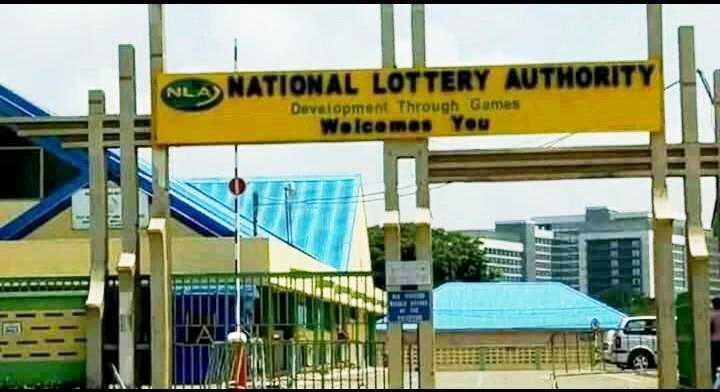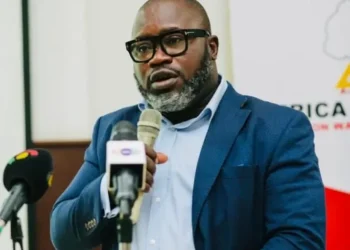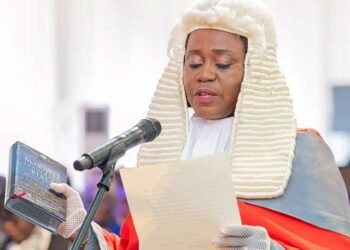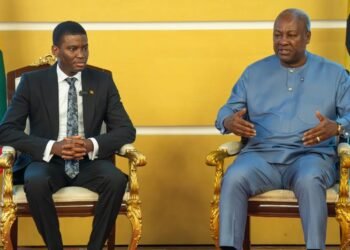The NLA scandal continues to dominate Ghana’s political landscape, exposing systemic failures in governance and oversight.
Prof. Stephen Kwaku Asare, a legal expert and Democracy and Development Fellow at CDD-Ghana, has dissected the controversy, arguing that the real outrage lies not only in the reckless spending of public funds but also in the deafening silence of the institutions mandated to prevent such abuses.
When Parliament passed Act 722, it deliberately designed a system of five key gatekeepers to safeguard lottery proceeds.
These funds were meant to provide “care and protection for the physically or mentally afflicted, the needy, the aged, orphans, and destitute children.”
The National Lottery Authority’s (NLA) Good Causes Foundation was created to act as a social safety net, a fund that could, for instance, help a widow pay for her child’s life-saving surgery.
“But instead of wheelchairs for the disabled and textbooks for orphans, millions of cedis went to glossy award nights, African Prosperity Network, Independence Day fanfare, celebrity memoirs, the Chief of Staff’s Office, the Attorney-General’s Office for conferences, and even an astroturf in the constituency where the NLA’s Director-General later contested and won as MP.”
Prof. Stephen Kwaku Asare

However, recent investigations by The Fourth Estate revealed a disturbing reality: instead of being spent on essential services like wheelchairs, hospital beds, and textbooks, millions of cedis were diverted to corporate awards, lavish events, and political projects.
Prof. Asare described this shift bluntly, stating that these were not “Good Causes,” but rather “Good Cronies.”
Extravagant Spending and Elite Beneficiaries
The exposé detailed how large sums of money meant for vulnerable communities ended up enriching well-connected individuals and organizations.
Funds were used to support the African Prosperity Network, Independence Day celebrations, and even celebrity projects, such as a GHS 50,000 contribution to a millionaire footballer’s memoir.
An astroturf project was also funded in a constituency where the NLA’s former Director-General later contested and won as a Member of Parliament.
At the same time, psychiatric hospitals were left overcrowded, and orphanages were forced to scrape together resources to survive.
Prof. Asare argued that these outcomes were only possible because every gatekeeper responsible for oversight failed in their duty.
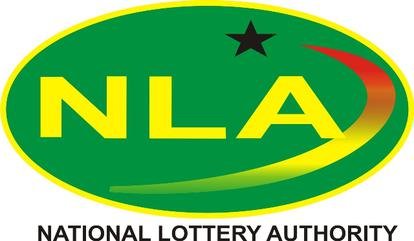
“They are given significant perks and privileges precisely to prevent Lotto funds from being used for Good-for-Nothing Causes. They had the power to stop reckless disbursements. Instead, they waved them through like ushers at a wedding reception.
“Alas, too many boards of public entities see themselves not as referees of public interest but as supporters’ unions of their appointing authority. Many board members lack expertise in governance and the backbone to fight for the people. They go along to get along.”
Prof. Stephen Kwaku Asare
The internal auditor, he explained, is mandated under Section 48 of Act 722 to conduct quarterly audits and report directly to the Minister, Auditor-General, and the NLA Board.
Despite this responsibility, he failed to raise alarms about questionable expenditures such as the ₵500,000 astroturf or the ₵50,000 memoir payment.
Prof. Asare likened the auditor’s silence to a traffic light during dumsor — present but utterly irrelevant.
Auditor-General: Reports Without Consequences
The Auditor-General also came under fire. With constitutional powers under Article 187 to disallow and surcharge unlawful expenditures, the Auditor-General’s office should have been a critical line of defense.
“Year after year, we get reports of irregularities without consequences,” Prof. Asare lamented. None of the disbursements identified by The Fourth Estate were flagged or presented to Parliament. Instead, compliance audits became little more than paperwork, with the watchdog writing reports but never biting.
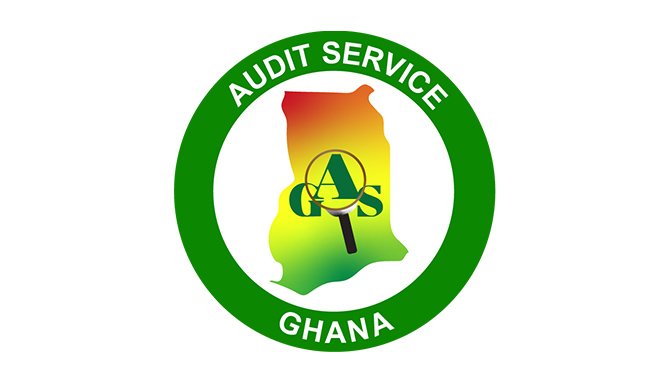
The Ministry of Finance, designated as the supervisory body under Section 54, was also implicated in this systemic failure. According to Prof. Asare, political kinship often turns genuine oversight into silent complicity.
Rather than questioning why lottery funds were being used to sponsor gala nights, the ministry appeared to treat state-owned enterprises like private family businesses.
Similarly, the State Interests and Governance Authority (SIGA), tasked with keeping state-owned enterprises in check, acted like an “absentee landlord,” only reacting after the scandal became public.
By then, the money was gone, and the needy were left waiting for support that never came.
Why The System Failed
Prof. Asare highlighted several factors behind this widespread breakdown in oversight. He explained that individuals tasked with safeguarding the system were chosen for their political loyalty rather than their ability to act independently.
Public funds were treated as if they were an endless pool of personal wealth, reinforcing the “Aban sika” mentality.

Oversight bodies operated without fear of repercussions for neglecting their duties, and when scandals were exposed, they were quickly politicized and swept aside, creating an environment where wrongdoing flourished unchecked.
“The Outrage Gap: Exposés of scandals rarely trigger aluta. A million-cedi gala cheque here, a misplaced fund there — and the nation shrugs. We save our placards and our lungs for when the looter is arrested. Only then do we suddenly discover our voices, but by that time the loot is long gone and the case is bogged down in adjournments.”
Prof. Stephen Kwaku Asare
“This culture of delayed outrage is exactly why watchdogs feel safe sleeping,” he warned. When citizens treat revelations as mere gossip, those tasked with oversight learn that silence comes at no cost.
A Call For Real Reform Amid NLA Saga
To address the crisis, Prof. Asare proposed institutionalizing Operation Recover All Loot (ORAL), a fast, transparent mechanism to trace and recover misused funds.
This, he emphasized, must not be another public relations stunt but a decisive effort to return every misappropriated cedi.
He further recommended barring officials who failed in their duties from holding any future public office. “A watchdog that dozes through a burglary has no business guarding the treasury again,” he stressed.
Prof. Asare also called for strict enforcement of Article 187(7)(b), which allows for surcharging officials personally responsible for financial mismanagement.

Nothing, he argued, would straighten officials’ spines faster than being held personally liable for lost funds.
Other reforms included appointing independent, professional board members rather than political cronies, and implementing real-time oversight by Parliament and SIGA, with quarterly reporting to prevent misuse before it happens.
Prof. Asare concluded by reflecting on the original purpose of the Good Causes Foundation. It was meant to be a lifeline for Ghana’s voiceless and vulnerable.
Instead, it has become a loudspeaker for the powerful, amplifying the interests of elites while silencing the needs of the poor.
“Unless ORAL is institutionalized, unless gatekeepers are held personally liable and disqualified for sleeping on duty, and unless watchdogs start biting, this will not be the last gala funded by money meant for the needy.”
Prof. Stephen Kwaku Asare
The question, he said, is whether these five gatekeepers will rise to their duty in the future, or once again stand by as public resources are plundered in plain sight.
READ ALSO: Ghana Pledges Universal Electricity Access by 2030 Under Mission 300



